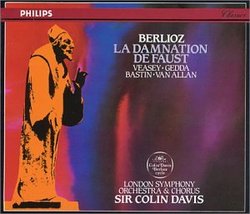| All Artists: Hector Berlioz, Sir Colin Davis, Josephine Veasey, Nicolai Gedda, Jules Bastin, Gillian Knight, Richard van Allan, London Symphony Orchestra & Chorus Title: Berlioz - La Damnation de Faust / Veasey, Gedda, Bastin, van Allan, LSO, C. Davis Members Wishing: 0 Total Copies: 0 Label: Philips Release Date: 9/11/2001 Genre: Classical Styles: Opera & Classical Vocal, Symphonies Number of Discs: 2 SwapaCD Credits: 2 UPC: 028941639523 |
Search - Hector Berlioz, Sir Colin Davis, Josephine Veasey :: Berlioz - La Damnation de Faust / Veasey, Gedda, Bastin, van Allan, LSO, C. Davis
 | Hector Berlioz, Sir Colin Davis, Josephine Veasey Berlioz - La Damnation de Faust / Veasey, Gedda, Bastin, van Allan, LSO, C. Davis Genre: Classical
|
Larger Image |
CD DetailsSimilar CDs
|
CD ReviewsGood Singing, Good Playing, Good Conducting, But ? R. Lane | Tracy, CA USA | 04/24/2004 (4 out of 5 stars) "This recording is part of the historic Colin Davis Berlioz cycle made for Philips in the 1970s. Philips originally release it in on CD the 1980s, and then they released it, without any changes in packaging or content, in 2001.La Damnation de Faust is not an opera; it is not meant for the stage. It is a concert work, not a theatrical piece. It can be adapted for the stage, of course, and has been very successfully many times. The male singers in this recording are hard to beat. Gedda in particular gives one of his best performances on record. The female singers are not the best, but they are very good. The chorus is also very good. All do reasonably well with the French diction and accents, though their mainly British heritage comes through from time to time.Not enough can be said about the orchestra. No other recording quite matches the playing of the LSO. Most of the other recordings use French orchestrs, and the French simply were not up to the same standard as the British when the recording was made.Colin Davis conducts a very lively performance. La Damnation features some of the most dymanic and bombastic music available, particularly in the Radetsky march. And Davis does not dissapoint there. He leads a performance that is equally as good in the action scenes and the dances as it is in the quiet moments of Faust's dispair and anguish.All in all, sounds like a 5 star rating. But, I only give it four stars for two reasons. While Davis is very competent in every section, I don't feel like he successfully puts all the pieces together for a cohesive whole. The individual pieces do not flow together very well. He focuses too much on the individual trees and never sees the forest.The recording is spectacularly captured by any standards. But, Philips could have gone back and made a new digital to audio remastering when they rereleased this in 2001. Instead, they used the same masters that were made with the first CD release in the 1980s. That master has some of the ill effects of early digitalizations, but it is bearable. The editing, though, is terrible. The Philips engineers did a very sloppy job of putting the pieces together. There are many times when I hear what can only be described as a tape splice, and the music thus looses much in terms of consistency and synergy.So, this is a very good recording for listening to the individual sections, and will give hours of joy. I admit, because of the fine music making I turn to this recording for Damnation more than any other. But I rarely listen to it from beginning to end because the end-to-end experience is just not there." GOETHE DID NOT COMMENT DAVID BRYSON | Glossop Derbyshire England | 11/19/2003 (5 out of 5 stars) "Colin Davis probably did as much as any musician since the war to establish Berlioz as a central musical classic. This set is the earlier of his versions of Faust. In terms of recorded tone and quality it is good, but needs a little management to be heard to best effect. Right at the start Faust may seem just a bit remote, so you will be tempted to turn up the volume, only to think better of that when the first major orchestral outburst, recorded with great fidelity, makes its impact. Similar issues of tone-manipulation continue to present themselves throughout the set, but when you have been through it once you will have worked out your solution to what is only a minor problem with modern technology. In terms of the interpretation of the work, I doubt if there has been any better since, his or anyone else's. Davis seems a complete natural for this extremely French music, much as Previn seems to be for English music. He understands his man through and through and finds no contradiction between the grandiose effect-maker and the lyricist who can take his place with Schubert, Weber and Brahms. For me, the crucial qualification in an interpreter of Berlioz is that he must know how to relax. This music, like Ravel's, will gather not just power but immense power through its own idiom and in the composer's good time, and it must not be forced in any way. Davis gets the Rakoszy march to perfection, and if that can actually be said for most conductors these days, I suspect it is in no small measure down to Davis that the standard has been set. Where vividness is called for, as in some of the more pantomimish turns by Mephistopheles, Davis gets his orchestra to respond admirably. If the result slightly suggests the version of the Devil ridiculed by C S Lewis's Screwtape as something in red tights, I suspect that was Berlioz's vision anyway.Faust himself is far and away the most important vocal part. Faust here is sung by no less than Gedda, and his rendering has probably been the touchstone ever since. He is something like perfect, although I confess I was not listening, nor inclined to listen, for minutiae of his French pronunciation. In sound alone Mephistopheles is largely a singer of beautiful lyric music with a number of outbursts when the composer remembers to be diabolic, and while I can't associate Jules Bastin with this view, if that's what it happened to be he carries it off admirably. I have a particular liking for the steady, unexaggerated and affecting Marguerite of Josephine Veasey, and it only remains to trot out routine but sincere and appreciative compliments to everyone else concerned.Since writing the above I have had the chance to see as well as hear Berlioz's Damnation of Faust on DVD. He was a rum one, was Berlioz. It was only to be expected that he would be taken with the Faust legend, considering the impact Goethe's Faust had on the entire romantic movement. Duly captivated, he treats us to what is in large part one of his highest achievements in `absolute' music, with its wonderful instrumental episodes and its numerous songs. Whether it really comes near to Goethe's great enquiry into what perdition, salvation, indeed the soul itself, may consist of I have never been too sure. It may be that there is a dimension missing from even the finest sound-only rendering, which is very likely this one, and that the work is crying out for staging. One way or the other, neglect it at the peril of your musical soul." Amazing opera Sungu Okan | Istanbul, Istanbul Turkey | 10/28/2003 (5 out of 5 stars) "This is one of the most fantastic operas ever written. And, I think, this is the most succesful stage work by Berlioz.As you know, Berlioz written an early study work based on Gothe's Faust, named "Eight Scenes from Faust"...and some of these scenes are, "Easter Scene", "The King of Thule", Romance of Margharete"...And this opera (or dramatic legend) scored for very large ensemble (as usual in Berlioz): very huge chorus (or 2 choirs), children's choir, in orchestra: tripled woodwinds (with 4 bassoons), 6 horns, 6 trumpets, 3 trombones, 2 tubas, 2 set timpani, bass drum, cymbals, snare drum, gong, bells, 10 (!) harps, about 60 - 70 strings... But, soloists are only three: Faust (tenor), Margharete (soprano), and Mephistopheles (bass - baritone)...And performers are excellent. Especially, Jules Bastin's Mephisto interpretation is terrific. And also, Josephine Veasey (Margharete) is very good, especially in "The King of Thule" (a gothic song)... And, still, Nicolai Gedda known from his French Composers' interpretations, especially both Faust operas of Berlioz and Gounod's.Still, Colin Davis is one of the best performers of Berlioz, and still, he has recorded almost complete orchestral and choral works of Berlioz. And Choruses are amazing, especially Men's Chorus in Pandeomonium (Victory of Mephisto and Devils) are excellent. Still, this movement is very difficult for both of Chorus and Orchestra. Because, in Chorus, Berlioz written lyrics be constitued from unknown language, so all words (in this scene) have not any meaning! (he was used some of the names of Devil's!). And this recording was awarded with Grammy (in the best Choral Performance)I like especially this movements: 1st Act: Solar Eclipse Scene, Hungarian March (still, this is the most famous movement, as you know). 2nd Act: Easter Scene, The Chorus of Soldiers (last movement). 3rd Act: The King of Thule, Duo of Faust and Margharete. 4th Act: Romance, Pandaemonium (of course)...And this box-set has a thick booklet, includes synposis and (in four languages) libretto...In other words: this is a must have for any Berlioz fans and opera admirers.Highly recommended."
|

 Track Listings (19) - Disc #1
Track Listings (19) - Disc #1

